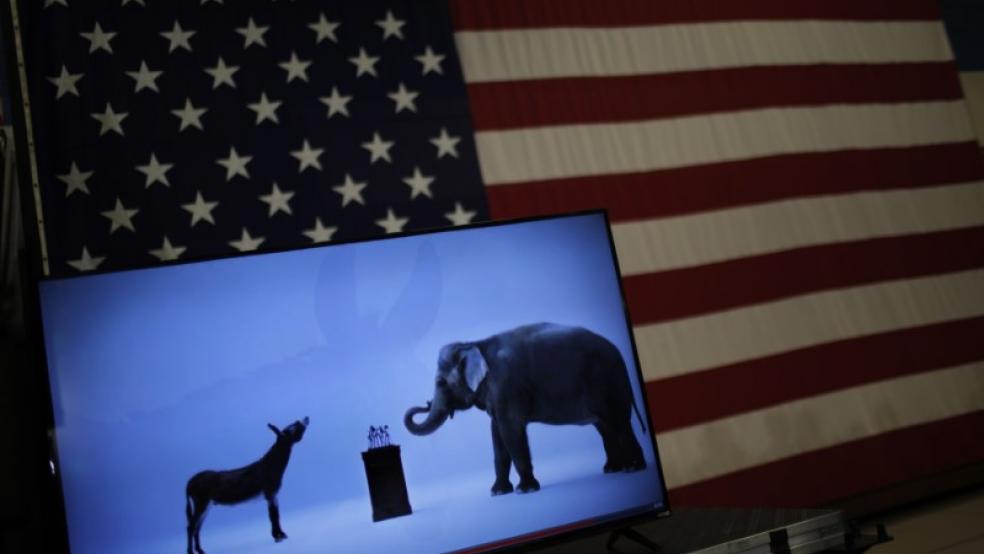Hillary Clinton moved to within arm’s reach of the Democratic presidential nomination after a near-sweep of Tuesday night’s primary elections.
The former secretary of state notched victories in Pennsylvania, Maryland, Connecticut and Delaware, boosting her delegate count to well over 2,000 as she closes in on the 2,383 required to become her party’s standard bearer in the fall.
Related: Super Tuesday No. 4: The End of the Line for Bernie Sanders?
Meanwhile, Sen. Bernie Sanders (I-VT), once an electrifying phenomenon in the Democratic primary, managed to avoid an embarrassing blow-out, winning the Rhode Island primary in what essentially amounts to a consolation prize since the state carried the night’s second-smallest delegate total.
For now, the Sanders camp — bitter and disappointed about having fallen so far behind Clinton after waging what many agree was an extraordinarily effective campaign — appears unwilling to give up until he reaches the convention this summer. Sanders took the stage in West Virginia, which holds its primary on May 10, minutes after the polls closed and delivered his standard stump speech, a sign that his campaign doesn’t plan to undergo a major reassessment any time soon.
He pointed to some public opinion polls that showed he would perform better than Clinton among a wider electorate and against Republican frontrunner Donald Trump, who declare himself the GOP’s “presumptive nominee” after winning all five northeast primaries.
"That is a point that I hope delegates to the Democratic convention fully understand," Sanders said.
Related: Can Elizabeth Warren Save Bernie Sanders?
In a statement released by his campaign, he congratulated his rival on her victories but sounded determined to fend off the inevitable calls for him to suspend his campaign and unite the party behind Clinton — even as he made clear that his fight now is more about influencing the Democratic Party’s policies than winning its nomination.
“The people in every state in this country should have the right to determine who they want as president and what the agenda of the Democratic Party should be,” he said. “That’s why we are in this race until the last vote is cast. That is why this campaign is going to the Democratic National Convention in Philadelphia with as many delegates as possible to fight for a progressive party platform that calls for a $15 an hour minimum wage, an end to our disastrous trade policies, a Medicare-for-all health care system, breaking up Wall Street financial institutions, ending fracking in our country, making public colleges and universities tuition free and passing a carbon tax so we can effectively address the planetary crisis of climate change.”
Still, Clinton’s solid performance Tuesday night, just a week after her double-digit victory in New York’s primary, was another stinging reminder to Sanders that he’s failed to broaden his appeal to a more racially diverse electorate and to women.
Exit polls showed Clinton clobbering Sanders among non-whites and women in Maryland and Pennsylvania, winning by margins of 60 percent and more. The results represented the same problem that has dogged Sanders throughout the campaign, especially in the South and industrialized Midwestern states like Ohio.
Clinton clearly felt the love when she delivered a brief victory speech to supporters in Philadelphia, where’s she’s now more likely than ever to be named the presidential nominee at the Democratic convention in July. But rather than twist the knife, her remarks stressed unity — something that could be in short supply if the two-person race drags on as Sanders seemed to suggest.
“We will unify our party to win this election,” she said, before touching on Sanders’ key economic issues and the “dark money” that pervades American politics.
“Whether you support Senator Sanders or you support me, there’s much more that unites us than divides us,” Clinton told the crowd.
Related: Sanders to Clinton: Here’s What My Support Will Cost You
Clinton is eager to turn the page and begin focusing more on the fall campaign against Trump, instead of expending more resources and time on a Democratic primary race that for all intents and purposes is over.
In her victory speech, Clinton broke into a common refrain, starting several sentences with a single phrase: “We Democrats agree….” The device could be interpreted as the former first lady pivoting, in earnest, toward a general election against Trump, but the words also serve as a bridge for Sanders fervent supporters, easing the path for them to migrate to Clinton’s camp.
Clinton called on Democrats, Independents and “thoughtful Republicans” to coalesce behind her candidacy because “we want America to be in the future business.”
The comments were just further proof that Clinton is now looking past Sanders and eyeing the GOP.
“Let’s win the nomination and in July, let’s return as a unified party!” she said.






